Game development has evolved into a dynamic and accessible field, with aspiring developers finding numerous platforms to bring their creative visions to life. Whether you’re a seasoned developer or a newcomer to the world of game design, the right platform can make all the difference. In this blog post, we’ll explore the top 10 game development platforms that empower creators to build captivating and immersive gaming experiences.
Unity:
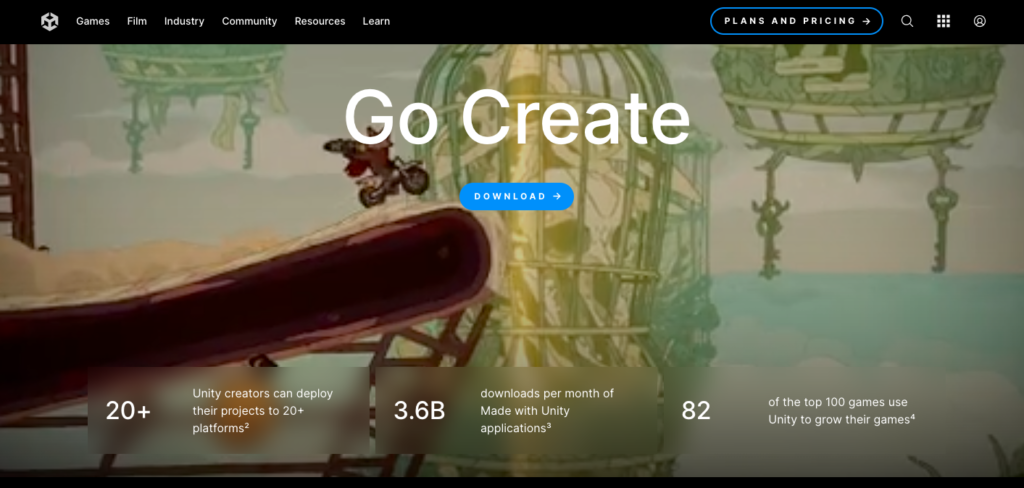
Unity stands out as one of the most popular and versatile game development platforms. It supports both 2D and 3D game development and provides a user-friendly interface for developers of all skill levels. Unity also offers a vast asset store, a thriving community, and cross-platform deployment capabilities, making it an excellent choice for indie developers and large studios alike.
- Cross-Platform Development: Unity allows developers to create games for various platforms, including mobile (iOS, Android), desktop (Windows, Mac), consoles, and even augmented reality (AR) and virtual reality (VR) platforms.
- Asset Store: Unity’s Asset Store is a vast marketplace offering a wide range of assets, plugins, and tools, enabling developers to enhance their projects with ready-made resources.
- Community Support: Unity boasts a large and active community where developers can seek help, share knowledge, and collaborate on projects, fostering a supportive environment for learning and growth.
Unreal Engine:
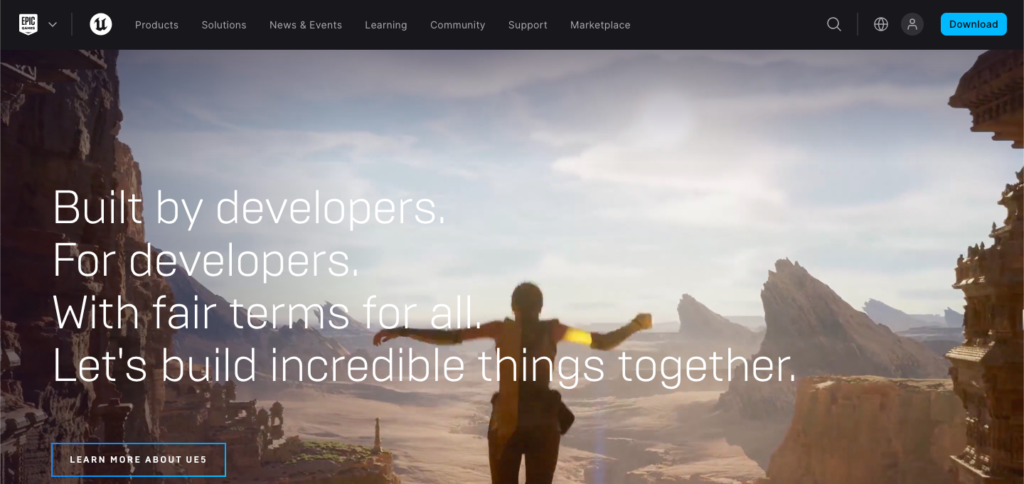
Developed by Epic Games, Unreal Engine is a powerhouse in the gaming industry. Known for its stunning graphics and robust performance, Unreal Engine caters to both novice and experienced developers. Its Blueprint visual scripting system allows for rapid prototyping, while its C++ API provides flexibility for advanced programmers. With its impressive rendering capabilities, Unreal Engine is a top choice for creating high-end, visually appealing games.
- Stunning Graphics: Unreal Engine is renowned for its cutting-edge graphics and realistic visual effects, making it a preferred choice for developers aiming to create visually striking and immersive games.
- Blueprint Visual Scripting: Unreal Engine’s Blueprint system empowers developers to create game logic and behaviors through a visual scripting interface, reducing the need for extensive coding and facilitating rapid prototyping.
- Marketplace: Similar to Unity’s Asset Store, Unreal Engine’s Marketplace provides a wealth of assets, plugins, and environments, streamlining the development process by offering pre-made content.
Godot Engine:
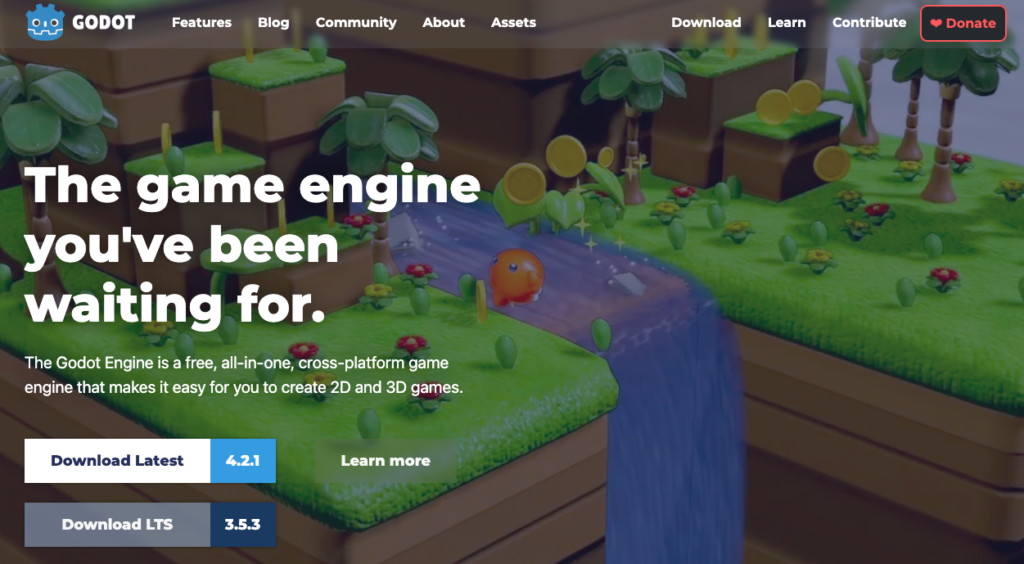
Godot Engine is an open-source game development platform that has gained popularity for its simplicity and flexibility. It supports both 2D and 3D game development and features a unique scene system for organizing game elements. With no licensing fees, Godot is an excellent choice for indie developers on a budget. The engine also encourages collaboration with its collaborative scene editing capabilities.
- Open-Source and Free: Godot is open-source and completely free to use, making it an attractive option for indie developers and those on a tight budget.
- Node-Based Scene System: Godot’s node-based scene system simplifies the organization of game elements, enhancing workflow efficiency and making it easier to manage complex projects.
- Collaborative Editing: Godot supports collaborative scene editing, allowing multiple developers to work on the same project simultaneously, fostering teamwork and facilitating efficient project development.
GameMaker Studio:
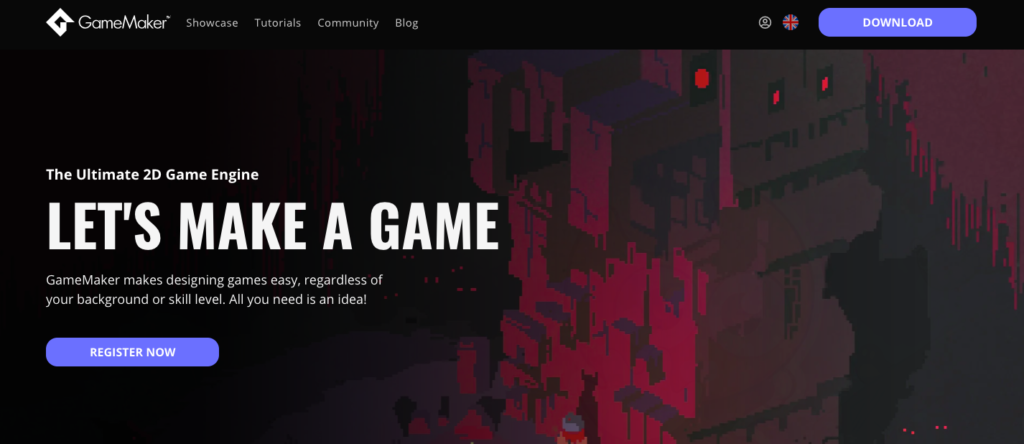
GameMaker Studio caters to developers who want to focus on 2D game development without delving into complex programming languages. It utilizes a drag-and-drop interface for visual coding and supports the creation of games for multiple platforms. GameMaker Studio is an ideal choice for those new to game development, offering a smooth learning curve and the ability to export games to various platforms.
- Drag-and-Drop Interface: GameMaker Studio’s drag-and-drop interface makes it accessible for those with little to no coding experience, allowing beginners to create games without delving into complex programming languages.
- Multiplatform Deployment: With GameMaker Studio, developers can export their games to various platforms, including Windows, Mac, iOS, Android, and more, ensuring broad accessibility for their creations.
- Community and Tutorials: GameMaker Studio has a supportive community and a wealth of tutorials, making it an excellent choice for beginners seeking resources and guidance.
Construct:
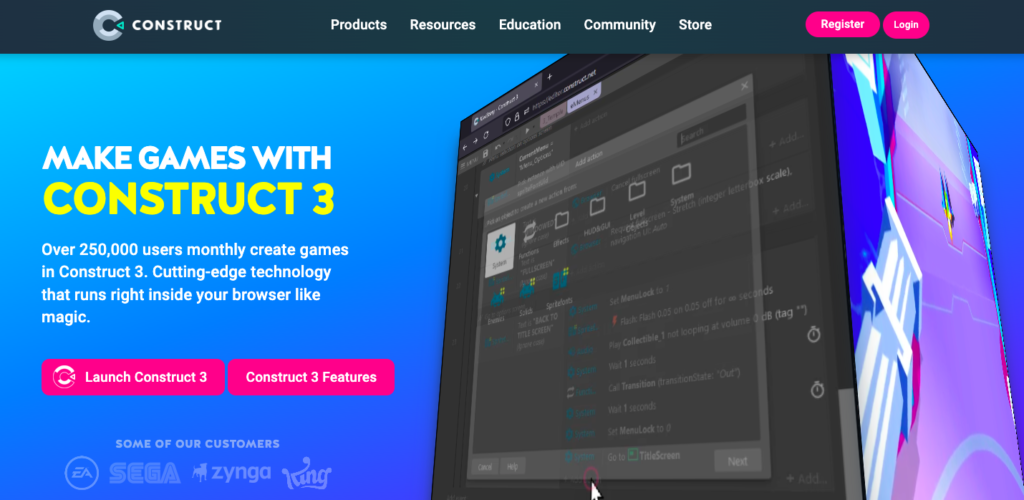
Designed for 2D game development, Construct is a visual scripting engine that requires no coding. With a focus on rapid game prototyping, Construct simplifies the game development process by allowing developers to create games through a series of events and actions. Its user-friendly interface is perfect for beginners, and it supports exporting games to various platforms.
- Visual Scripting: Construct’s visual scripting engine simplifies the game development process, allowing creators to design games through a series of visual events and actions, eliminating the need for traditional coding.
- Rapid Prototyping: Construct is designed for rapid game prototyping, enabling developers to quickly iterate and test game ideas before diving into full-scale development.
- Export to Various Platforms: Construct supports exporting games to multiple platforms, making it versatile for reaching a wide audience.
CryEngine:
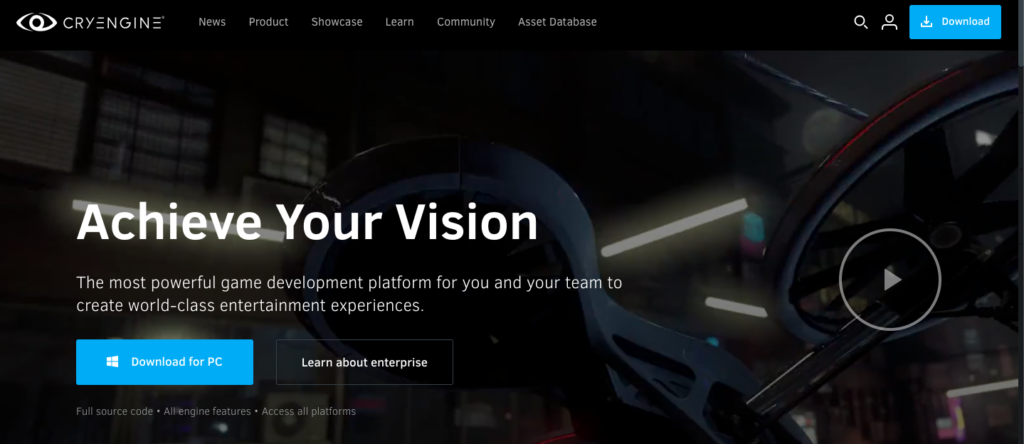
CryEngine is renowned for its powerful graphics capabilities, enabling developers to create visually stunning games. Originally developed for the Crysis series, this engine has evolved into a versatile platform for both indie and AAA game development. With features like real-time global illumination and dynamic weather systems, CryEngine is a solid choice for developers aiming for top-notch visuals.
- High-End Graphics: CryEngine is renowned for its impressive graphics capabilities, supporting features like real-time global illumination, dynamic weather systems, and advanced visual effects.
- Realistic Environments: CryEngine excels in creating realistic and immersive environments, making it a preferred choice for developers working on projects that require a high level of visual fidelity.
- VR and AR Support: CryEngine supports virtual reality (VR) and augmented reality (AR) development, allowing creators to explore and innovate in the rapidly evolving world of immersive experiences.
Cocos2d-x:
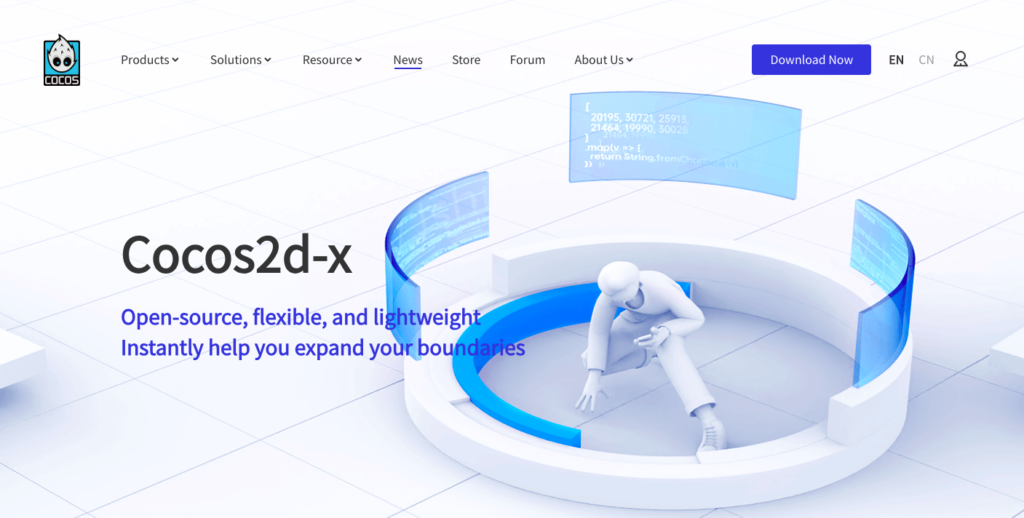
Cocos2d-x is an open-source framework for developing cross-platform 2D games. Supporting multiple programming languages, including C++, JavaScript, and Lua, it offers flexibility for developers with different skill sets. Cocos2d-x has gained popularity for its efficiency in creating mobile games and supports platforms like iOS, Android, and Windows.
- Cross-Platform Development: Cocos2d-x enables developers to create games for multiple platforms, including iOS, Android, Windows, and more, ensuring broad accessibility for their games.
- Multiple Programming Language Support: Cocos2d-x supports various programming languages, including C++, JavaScript, and Lua, providing flexibility for developers with different coding preferences.
- Active Community: Cocos2d-x has a vibrant community that actively contributes to its development and provides support and resources for fellow developers.
RPG Maker:
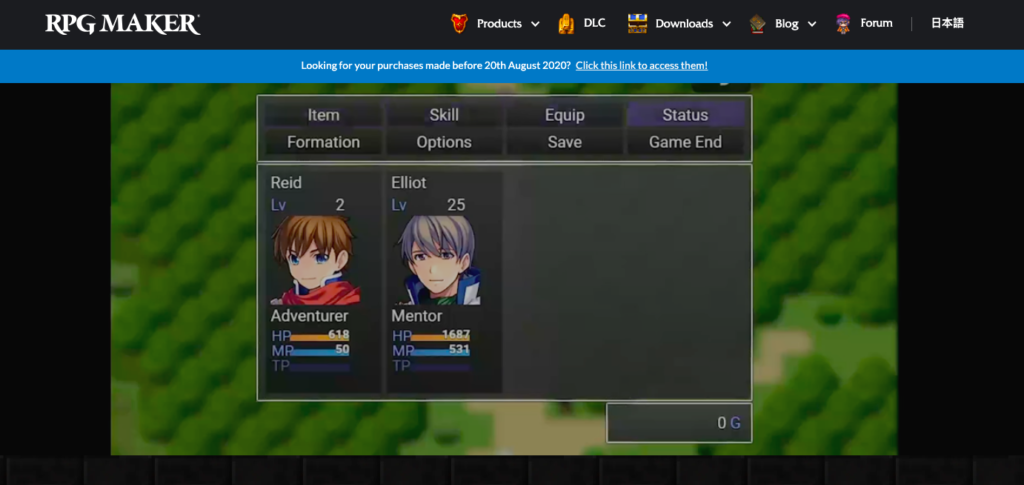
Specifically tailored for creating role-playing games (RPGs), RPG Maker simplifies the game development process by providing pre-built assets and an easy-to-use event system. While it may not be as versatile as some other platforms, RPG Maker is an excellent choice for those interested in crafting narrative-driven games without the need for extensive coding.
- Pre-Built Assets: RPG Maker comes with a range of pre-built assets, including characters, maps, and sound effects, streamlining the game development process for those focused on creating role-playing games.
- Event System: RPG Maker’s event system simplifies the implementation of game logic and interactions, making it easy for developers to create engaging and narrative-driven RPG experiences.
- User-Friendly Interface: RPG Maker’s user-friendly interface is tailored for those with little programming experience, making it accessible for beginners and storytellers.
Phaser:
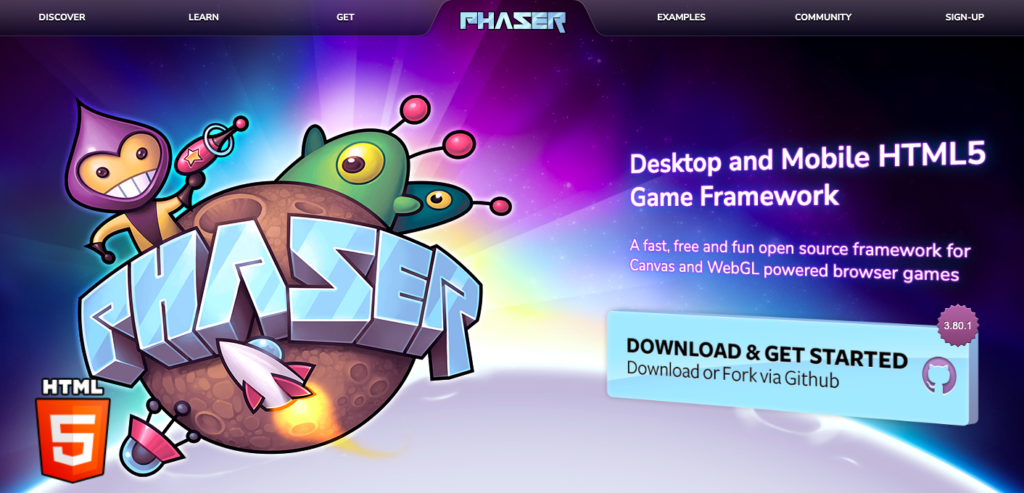
Phaser is a lightweight and fast 2D game framework for creating browser-based games. Utilizing JavaScript, Phaser is accessible to web developers and provides a range of features for building interactive and engaging games. It’s an excellent choice for those looking to enter the world of HTML5 game development.
- HTML5 Game Development: Phaser is designed for HTML5 game development, allowing developers to create browser-based games that can be easily shared and played online.
- JavaScript Programming: As Phaser is built with JavaScript, it appeals to web developers and those familiar with the language, making it a seamless transition for those already working in web development.
- Extensive Documentation: Phaser provides extensive documentation and a supportive community, facilitating learning and problem-solving for developers at all skill levels.
Amazon Lumberyard:
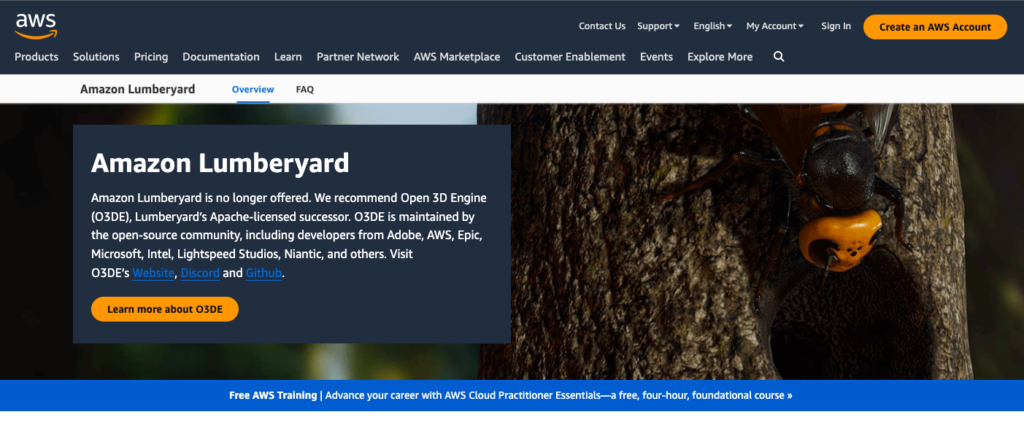
Amazon Lumberyard is a robust game development platform that integrates seamlessly with Amazon Web Services (AWS). With features like cloud-based multiplayer and Twitch integration, Lumberyard is well-suited for creating immersive online experiences. It supports both 3D and VR game development and provides a range of tools for creating high-quality games.
- Integration with AWS: Lumberyard seamlessly integrates with Amazon Web Services (AWS), providing developers with scalable cloud solutions for features such as multiplayer gaming and content storage.
- Twitch Integration: Amazon Lumberyard includes built-in Twitch integration, allowing developers to create interactive experiences that connect with the Twitch streaming platform.
- Visual Scripting and C++: Lumberyard offers both visual scripting tools and C++ for programming, providing flexibility for developers with different coding preferences and skill levels.
The world of game development is vast and diverse, offering a plethora of platforms to suit different needs and preferences. Whether you’re a beginner exploring the basics of game design or an experienced developer pushing the boundaries of innovation, these top 10 game development platforms provide the tools and resources necessary to turn creative visions into captivating gaming experiences. Choose the platform that aligns with your goals and embark on a journey to bring your game ideas to life.


